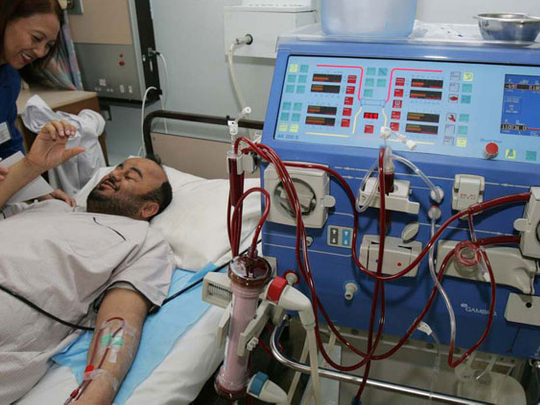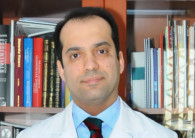
With the opening of the first kidney transplant clinic at Dubai Hospital, we ask Dr Farhad Kheradmand Al Janahi, specialist urologist and transplant surgeon heading the clinic, basic questions about renal disease and transplant procedures.
1. What’s the percentage of people suffering from kidney failure in the UAE?
The incidence of kidney disease is on the rise as nearly 20 per cent of people in the UAE have diabetes and nearly a fourth of the diabetic patients go through some form of renal failure.
2. What have been the treatments so far in the UAE to tackle kidney failure?
Renal therapies are two kinds – one where you can manage with dialysis and medication and second where you need a renal transplant.
3. When is a kidney transplant required?
When a patient has end-stage renal failure, that is the time you need renal replacement therapy.
4. What are the symptoms?
The role of the kidney is to rid the body of waste products and when there is failure, the patient feels tired and irritable and has oedema (water retention). A simple blood test to check the creatinine levels of the body will help determine if a person is suffering from kidney disease or failure.
5. What are the factors to be considered for the transplant regarding the age of patient, receptivity and any other issues?
We can carry out a renal transplant in children as well as adults, even those who are beyond 70 years of age. What is really important is that the recipient must be fit enough to go under general anaesthesia. In case of children, they receive kidneys from adults so their minimum weight has to be 10kg or above. Usually patients who need a kidney are not healthy or fit and have diabetes, hypertension etc. So they need to have all the vital parameters of health well under control to be able to undergo the surgery.
6. What does the surgery involve? How is the donor kidney stored till the operation?
A transplant surgery is conducted under general anaesthesia where the kidney is removed from the donor through key-hole surgery and then through an open procedure it is transplanted through the lower abdomen and groin into the recipient. The surgery is simple and lasts about two to three hours. The surgery is conducted almost simultaneously in case of a live donor. The surgeon removes the kidney from the donor and, in a back table procedure, prepares the kidney by cleaning the fat deposits and preparing the blood vessels and placing it in the groin of the recipient. In many cases the old kidney is not removed while the new one is put in. Only in cases where the previous kidney is infected or has a tumour is it removed.
In Europe where a majority of kidneys come from deceased or brain-dead donors, we can store the kidney up to 24 hours in special solutions. Usually the solution that is used is called the University of Wisconsin (UW) solution. Sometimes with a use of a machine a kidney can stored up to 48 hours.
7.What are the factors to be considered for a donor kidney?
The most important factor for the donor to be considered is that he is not at risk of renal failure where he is likely to need his spare kidney in successive years. So if a donor is a family person, the doctor needs to screen him for hypertension, diabetes and congenital kidney disease to make sure he is healthy and will not require his spare kidney later. In fact the donor needs to go through all kinds of screening and in Europe most donors live longer as they go through such close screening throughout their lives to ensure they are not likely to catch any life-threatening disease. Besides that, in most countries, kidney transplants are done ethically and professionally where we make sure that the donor is under no financial or emotional obligation. The entire team of transplant surgeons conducts a close psychological assessment of the donor. This is the norm in all countries that have a regulated donor market.
One cannot be sure that these factors are taken into consideration in countries that have an unregulated market where kidney donors are paid a price for their kidney.
8. What is the timeline of a kidney transplant?
Once a patient receives a successful transplant he is screened immediately after the surgery, weekly, monthly, quarterly, six monthly, up to a year. He can be assured of good health from five-fifteen years after which he or she can assess kidney functions through a simple renal test and go for another transplant. I have had patients who have gone through two or even three transplants and lived a full span.
9. How many people are open to the idea of transplantation as opposed to dialysis, due to psychological fears?
We are getting pairs of four to five pairs of patient at our Dubai Hospital clinic for transplantation consultation. People are now slowly opening up to the idea of dialysis. However, I would like to reiterate as a doctor that prevention of kidney disease is always better. One mustn’t think ‘oh a kidney is available, I can afford ill-health’. One must exhaust other therapies, medication and keep diabetes under control to be able to prevent renal disease.
10. What is the percentage of worldwide success rates compared to rejection?
Worldwide the success rate of kidney transplants is nearly 95 per cent. Surgeons carry out assessment of the recipient immediately after surgery, after three months, after six months and then nearly a year. Usually, if the donor is younger and if the recipient is sensitive to the medication regimen that he has to follow and keeps his other diseases such as diabetes and hypertension under control the chances of success are prolonged and very high.
11. Why does rejection occur?
Rejection occurs when the immunosuppressant drugs that the patient is taking to prevent rejection of the donor kidney does not work properly or the patient contracts some sort of viral infection. But this can be monitored and, depending on the type of rejection, the kidney can be salvaged. We carry out blood tests and biopsies to determine the cause of rejection and sometimes by changing the immunosuppressant drugs and closely monitoring the creatinine levels of the patient we are able to salvage the kidney.
12. If there is rejection once, can there be a retry?
Yes, you can try to give a new kidney to a recipient the next day provided a donor kidney is available. However, our blood makes antibodies against the donor kidney and the chances of the next donor kidney being rejected are also higher. But I have seen many successful cases where a second or third retry has been successful.
13. What is the approximate cost of a kidney transplant?
The surgery approximately costs around Dh25,000-Dh30,000 in countries that have regulated markets. As per the 2004 Istanbul declaration on organ trafficiking there is no cost involved for the kidney, it is only the cost of the surgery. The cost of the immunological tests and the immunosuppressant drugs is slightly higher. But in Dubai, the cost of dialysis per patient per year is approximately Dh200,000. So it makes much more sense to get a kidney transplant if you have a donor than go through dialysis.
14. Post-surgery — everything you need to know — diet, lifestyle, stress control, etc.
The patient is allowed to eat everything. However if he is suffering from diabetes or hypertension he has to keep his vital parameters such as sugar, blood pressure, etc, well under control. The recipient has to be under life-long immunosuppressant drugs and has to make sure he consistently follows that medication regimen.
15. What happens ff only one kidney is damaged versus two kidneys damaged?
One can live on half a kidney, so you can very well live with one kidney, but if both your kidneys are damaged you most certainly need one donor kidney for survival.
16. Is dialysis free for expats?
We talked of the approximate cost of dialysis per patient per year. However, there are many charities at Dubai hospitals helping out expatriate patients.
17. How many cases can the clinic handle in a month?
We are planning to commence transplant surgery from the end of March 2014 and already have four to five pair of donor–recipients come in each day. The clinic can handle up to two transplants a day.
18. What are the reasons for the lack of such a facility in Dubai?
There were many reasons such as a lack of availability of transplant experts such as nephrologists, surgeons, immunologists. Besides that there was this social mentality among patients to look for donors in unregulated third world markets. This mentality has changed considerably now. The incidence of renal diseases has been rising and hence the need to have a dedicated transplant facility was keenly felt now.
19. What difference do unregulated and regulated conditions make and why?
As discussed, in unregulated markets there is no assurance of ethical and professional kidney donors. The donor who is not screened for his health and is trading his organ might not be in the best of health. The recipient who is buying the kidney may not be all that compliant in terms of being consistent with his immunosuppressant therapy. In a regulated market one can make sure that the donor is under no emotional or financial obligation. A very close psychological assessment of both the recipient and donor is conducted by a team of specialists. If the recipient is someone who has been lagging in his dialysis treatments, the team makes sure he is compliant and will take full responsibility for following the medical regimen after the surgery.
20. After donation does the donor need to observe any rules?
The donor needs to have regular health screenings to make sure his sugar and blood pressure and other vital parameters are under control so that a situation does not arise where he might be in need of a kidney later.
21. Are there enough donors? What are the issues for the donors — volunteers vs brain-dead cadavers?
Worldwide there has been a shortage of kidneys. In Dubai we accept only live and volunteer donors. The law where transplants can be carried out from brain-dead patients and from cadavers has not come into effect. Once this happens, perhaps it will impact the shortage situation positively.













